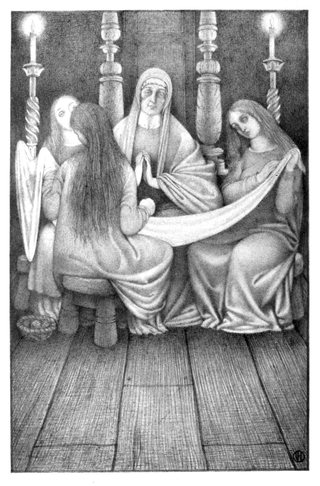Related Research Articles
Sir Aldingar is an English-language folk song. Francis James Child collected three variants, two fragmentary, in The English and Scottish Popular Ballads. All three recount the tale where a rebuffed Sir Aldingar slanders his mistress, Queen Eleanor, and a miraculous champion saves her.

"Hind Horn" is a traditional English and Scottish folk ballad.
"Hind Etin" is a folk ballad existing in several variants.
Fair Annie is Child ballad number 62, existing in several variants.

"Lord Thomas and Fair Annet", also known as "Lord Thomas and Fair Eleanor", is an English folk ballad.
"The Twa Magicians", "The Two Magicians", "The Lady and the Blacksmith", or "The Coal Black Smith" is a British folk song. It first appears in print in 1828 in two sources, Peter Buchan's Ancient Ballads and Songs of the North of Scotland and John Wilson's Noctes Ambrosianae #40. It was later published as number 44 of Francis James Child's English and Scottish Popular Ballads. During the 20th century, versions of it have been recorded by a number of folk and popular musicians.
King Estmere is an English and Scottish Child ballad and number 60 of 305 ballads collected by Francis James Child.
"The Fair Flower of Northumberland" is a folk ballad.
Leesome Brand is an English-language folk song.
"Sheath and Knife" is a folk ballad.

Fause Foodrage is a Scottish murder ballad of the 17th or 18th century. It was first printed by Walter Scott in Minstrelsy of the Scottish Border (1802). Scott cited Elizabeth, Lady Wardlaw as the ballad's probable author.
"The Bonny Hind" is a traditional English-language folk song.
"Gil Brenton" is an English-language folk song, existing in several variants.
"The Whummil Bore" is an English-language folk song. A whummil is a tool for drilling holes.
"The Marriage of Sir Gawain" is an English Arthurian ballad, collected as Child Ballad 31. Found in the Percy Folio, it is a fragmented account of the story of Sir Gawain and the loathly lady, which has been preserved in fuller form in the medieval poem The Wedding of Sir Gawain and Dame Ragnelle. The loathly lady episode itself dates at least back to Geoffrey Chaucer's "Wife of Bath's Tale" from The Canterbury Tales. Unlike most of the Child Ballads, but like the Arthurian "King Arthur and King Cornwall" and "The Boy and the Mantle", "The Marriage of Sir Gawain" is not a folk ballad but a song for professional minstrels.
"The Knight and the Shepherd’s Daughter" is an English ballad, collected by Francis James Child as Child Ballad 110 and listed as number 67 in the Roud Folk Song Index.
Bonny Bee Hom is an English-language folk song.
"Babylon", also called "The Bonnie Banks o' Fordie" or "The Banks o' Airdrie" is an English-language folk song.
Mr. Motherwell gives a version under the title of Babylon; or, the Bonny Banks o' Fordie; and Mr. Kinloch gives another under the title of The Duke of Perth's Three Daughters. Previous editors have attempted to find a local habitation for this tradition, and have associated it with the family of Drummond, of Perth. As a legend exactly similar is current in Denmark, this appears a bootless quest.
"Lizie Wan", also called "Lucy Wan" or "Fair Lizzie," is an English-language murder ballad.
"Brown Robyn's Confession" is an English-language folk song.
References
- ↑ Francis James Child, English and Scottish Popular Ballads, "The King's Dochter Lady Jean"
- ↑ Francis James Child, The English and Scottish Popular Ballads, v 1, p 185, Dover Publications, New York 1965
- ↑ Francis James Child, The English and Scottish Popular Ballads, v 1, p 450, Dover Publications, New York 1965